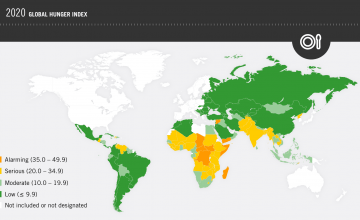
Read our 2023 annual report

Knowledge Hub
Global Hunger Index 2020
This is the fifteenth annual publication of the Global Hunger Index (GHI), a report jointly published by Concern Worldwide and Welthungerhilfe.

The Global Hunger Index (GHI) is a tool designed to comprehensively measure and track hunger at global, regional, and national levels. GHI scores are calculated each year to assess progress and setbacks in combating hunger. The GHI is designed to raise awareness and understanding of the struggle against hunger, provide a way to compare levels of hunger between countries and regions, and call attention to those areas of the world where hunger levels are highest and where the need for additional efforts to eliminate hunger is greatest.
Measuring hunger is complicated. To use the GHI information most effectively, it helps to understand how the GHI scores are calculated and what they can and cannot tell us. You can find out more here.
The 2020 report
The 2020 GHI shows that based on their recent trajectories, 37 countries appear unlikely to achieve even low hunger status by 2030. In multiple countries, hunger is now at even higher rates than it was in 2012, driven by conflict, poverty, inequality, poor health, and climate change. At the end of last year nearly 690 million people were suffering from chronic hunger, and 135 million people were experiencing crisis levels, or worse, of acute food insecurity
According to the 2020 GHI, of the 107 countries for which complete data are available for calculating GHI scores, three suffer for levels of hunger that are alarming - Chad, Timor-Leste and Madagascar - and 31 countries have serious levels of hunger.
Hunger is considered to be alarming in eight additional countries - Burundi, Central African Republic, Comoros, Democratic Republic of the Congo, Somalia, South Sudan, Syria and Yemen - and serious in nine additional countries based on provisional categorizations (Djibouti, Guinea, Guinea-Bissau, Lao PDR, Niger, Tajikistan, Uganda, Zambia, Zimbabwe).
VIDEO: GHI 2020 report launch
Marking this year’s World Food Day, Dr Mike Ryan, Executive Director of the World Health Organisation’s Emergencies Programme launched the 2020 Global Hunger Index. During his address, Dr Ryan said a One Health approach should be central to tackling hunger, adding: “there is an imperative now to act and we have the means to do it".
Click here to visit the GHI interactive map!
GHI scores are not calculated for most high-income countries, yet in many, food insecurity is still a pressing concern for significant portions of the population, particularly in the face of extraordinary crises such as the COVID-19 pandemic. In addition to the pandemic, an extraordinary outbreak of desert locusts is threatening food security in East Africa and Southwest Asia this year.
Furthermore, these projections do not account for the impacts of the COVID19 pandemic, which may worsen hunger and undernutrition in the near term and affect countries’ trajectories into the future.
The focus of this year’s special essay by Robyn Alders, Osman Dar, Richard Kock, and Francesco Rampa is on how to make our food systems more resilient to shocks, protect the most vulnerable, and transform the post–COVID-19 world of food and nutrition.
The events of 2020 have shown that our food systems are unfair and inadequate in ways that are impossible to ignore. But, by taking an integrated approach to health and food and nutrition security, experts believe it may be possible to achieve Zero Hunger by 2030. A ‘One Health’ approach could help avert future health crises, restore a healthy planet and end hunger.
This approach is based on a recognition of the interconnections between humans, animals, plants and their shared environment, as well as the role of fair trade relations. It focusses on increasing sustainable practices in agriculture and improving the overall health of humans, animals and the environment – rethinking how we produce, process, distribute and consume our food, as well as reduce food loss and waste.
The 2020 GHI has highlighted the need to fundamentally reshape our food systems to be fair, healthy, resilient, and environmentally friendly – and a One Health approach could be transformative.
The current crises must serve as a turning point not only to transform our food systems but to end the daily scourge of hunger - the greatest moral and ethical failure of our generation.






